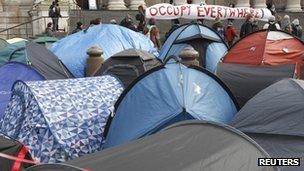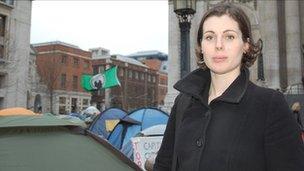How Occupy London camp's decision affects the right to protest
- Published

The camp outside St Paul's Cathedral was established on 15 October
In the case against Occupy London camp, the High Court heard arguments about the extent to which the local government law or planning law could restrict the right to freedom of expression and to freedom of assembly.
The rights of expression and assembly in the European Convention on Human Rights (articles 10 and 11) are upheld by the Human Rights Act 1998, but they are subject to restrictions.
Lawyers for the protesters argued the case was significant because of the "recent phenomena of the peaceful, but semi-permanent, occupation of civic spaces to highlight issues of political concern where the occupation is the very nature of the protest".
Ahead of the decision human rights barrister Anna Morris, from Garden Court Chamber, and property and housing law barrister Michael Paget, who represented one of the protesters in the case, explained the impact of the decision.
'Tension' between rights
Ms Morris said the Article 10 and 11 rights are not absolute and the court needs to determine the extent to which landlords can enforce their possession rights.
The "tension" lies between "the rights of [people using the public space], the rights of local authorities and public land owner - such as the church and City of London - against the legitimate right of protest".
"There have been a number of cases dealing with this balancing act over the last 10 years, very few of which have been successful since 2002/03, since Brian Haw's case and the Aldermaston case," she said.

Anna Morris thinks any increase in powers against lawful protesters should be viewed critically
"A success in this case would strengthen that civil right to protest within a space that is also used by members of the public".
Even though the protesters lost it was "an important case", Ms Morris explained.
"It is an important case for human rights because it reinforces the assertion that human rights to protest can be exerted in public spaces and what forum should be available for protests," she said.
"I would like to think that every local authority or public body which engages with peaceful protests thinks very carefully about how it conducts its activities without infringing the human rights of those who choose to demonstrate and that balance ideally should be done by the local authority first without needing the intervention of the courts."
"Politically, there must be concern that any increase in powers against lawful protesters should be viewed very critically".
Mr Paget, who deals with property and housing law, said the win for the City of London Corporation will not enhance the powers of the local authority under the Highways Act 1980 and planning laws.
But, it does mean that in this case the corporation's attempt "to prevent a breach of those statutes was a legitimate reason to interfere with the occupiers' article 10 and 11 rights and that a possession order was a proportionate interference".
Mr Paget said that even though the case went against the camp it still means that ideally "even though a local authority has powers under national law, it will need to consider is it necessary to enforce them in the way suggested".
"Article 10 and 11 rights can trump national rights," Mr Paget said.
But he added this case will not in any way have an impact on disputes on private land as it dealt with public spaces alone.
- Published20 December 2011
- Published19 December 2011
- Published23 November 2011
- Published21 November 2011
- Published16 November 2011
- Published3 November 2011
- Published28 October 2011
- Published26 October 2011